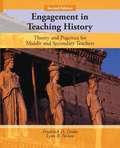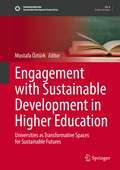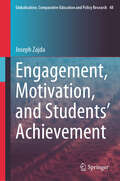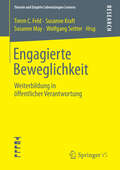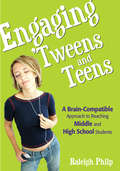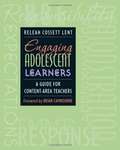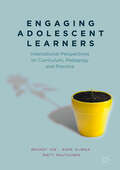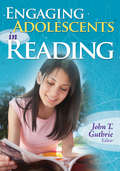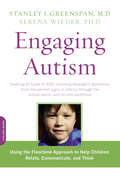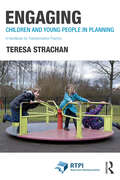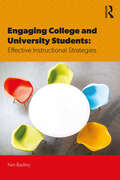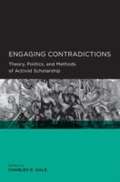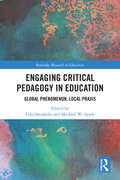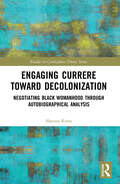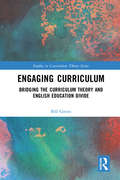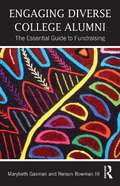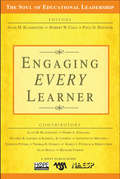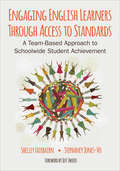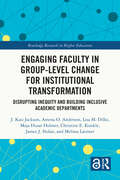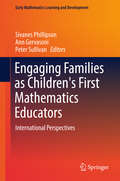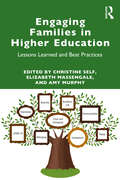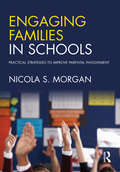- Table View
- List View
Engagement in Teaching History: Theory and Practices for Middle and Secondary Teachers
by Frederick D. Drake Lynn R. NelsonHow can history be taught effectively? Does knowing about the past give meaning to the present and hints to what will happen in the future? This book responds to these questions as it explores the key elements of history instruction–the use of primary sources and narratives, involving students in the historical inquiry through classroom discussions, teaching toward chronological thinking, and the use of historical documents to develop in students a “detective approach” to solving historical problems. Taking a systematic approach to improve students’ historical thinking, this book emphasizes certain strategies that will help students know more about the past in ways that will help them in their lives today. <P><P> The second edition is organized in three parts–Part One describes the theoretical background to teaching history. Part Two, Planning and Assessment, emphasizes the importance of good organization and lesson planning as well as how to assess students’ knowledge, reasoning power, and effective use of communication in the history classroom. Part Three, Instruction, focuses on the use of primary sources, class discussions, incorporating photographs and paintings, and writing in teaching history. Both the study of history and the teaching of history are multifaceted. The author’s hope in writing this book is to engage new and experienced teachers in thoughtful discourse regarding the teaching and learning of history and to develop lifelong learners of history in the 21st century.
Engagement in Teaching History: Theory and Practices for Middle and Secondary Teachers
by Frederick D. Drake Lynn R. NelsonWith an emphasis on engaging students in historical inquiry, problem solving, and discussion, Engagement in Teaching History offers a wealth of ideas for prospective teachers of history. The book addresses the selection of content, methods of instruction, and ways to assess students' learning. By following the text's guidelines for involving learners in historical inquiry, teaching toward chronological thinking, encouraging deliberative discussions, and using primary sources, teachers will ignite students' innate "detective" instincts and encourage them to think critically about historical events.
Engagement with Sustainable Development in Higher Education: Universities as Transformative Spaces for Sustainable Futures (Sustainable Development Goals Series)
by Mustafa ÖztürkThis edited volume analyzes cases of higher education programs engaging with sustainable development. Offering cases from across the globe that focus on the role of universities in promoting societal transformations and building sustainable futures, the volume specifically discusses how higher education institutions can educate for the Sustainable Development Goals (SDGs). As critical spaces for research, development, and innovation, higher education institutions are fundamental change agents for societal transformations. Their role in disseminating sustainability through different paths is undeniable, and it is worth discussing the dimensions that surround the concept of sustainability within universities. Considering the role of policy, curriculum, practice, teaching, research, and development paths in universities, this book looks at the contributions of higher education sector to our vision of sustainable development. This publication offers readers a chance to look at different higher education institutions’ engagement with sustainable development through political, managerial, curricular and practical steps.
Engagement, Motivation, and Students’ Achievement (Globalisation, Comparative Education and Policy Research #48)
by Joseph ZajdaThis book analyses discourses of the use of engagement and motivation in schools globally. It focuses on the overall impact of engagement on teachers, students’ motivation, students’ well-being, and standards. It examines the role of engagement and motivation impacting teachers and students in the classroom, and the overall impact of inclusive classroom models to improve their performance in the classroom. The book analyses topics such as cultural identities and engagement, students’ personalities and their impact on learning, the role of intelligence in learning, social learning, engagement in collaborative groups, and teachers’ role in promoting engagement in the classroom. The book contributes in a very scholarly way, to a more holistic understanding of the nexus between globalisation, dominant models of motivation, and students’ engaging learning environments, and their academic achievement.
Engagierte Beweglichkeit
by Susanne May Timm C. Feld Susanne Kraft Wolfgang SeitterAusbau und Verstetigung einer inklusiven Bildungsinfrastruktur für das Lernen Erwachsener sind dezidierte Aufgaben öffentlicher Weiterbildung. Grundversorgung, Zugänglichkeit und Bildungsgerechtigkeit signalisieren die politisch-gesellschaftliche Dimension der Aufgabenstellung, ein effizientes Management die ökonomische Dimension. Beide Perspektiven stehen im Zentrum dieses Bandes, der Klaus Meisel zum 60. Geburtstag gewidmet ist. Engagierte Beweglichkeit kann in institutioneller Perspektive als gleichzeitige Fokussierung auf Infrastruktur- und Angebotsgestaltung für das Lernen Erwachsener und auf wirtschaftlicheRessourcenoptimierung und Sparsamkeit gedeutet werden. In professioneller Perspektive verweist sie auf das habitualisierte Handeln der verantwortlichen Akteure, die nicht nur die Gestaltung des Lernens, sondern auch die Gestaltung in und an der Organisation in Bewegung bringen.
Engaging 'Tweens and Teens: A Brain-Compatible Approach to Reaching Middle and High School Students
by Raleigh T. PhilpGain a solid understanding of the basic neurobiology behind adolescent behaviors and invigorate your teaching practices using music, movement, and brain-based activities.
Engaging Adolescent Learners: A Guide for Content-area Teachers
by Releah Cossett LentExamine what it means to engage young adults in their learning and find out what classrooms with engaged students look, sound, and feel like. Let Releah Lent help you transform your classrooms into places where students have the freedom to satisfy their natural inclination to explore. With Engaging Adolescent Learners at your side, you'll have everything you need to help even the most reluctant students find a way to learn that works for them.
Engaging Adolescent Learners: International Perspectives on Curriculum, Pedagogy and Practice
by Brandy Yee Anne Sliwka Matti RautiainenThis book draws on detailed case studies from three very different countries and school systems to explore the early adolescent learner and the middle years of learning, both of which are often overlooked in the literature. An abundance of research shows the importance of the middle years in putting early adolescent learners on the path to success in further education, careers, and general wellbeing. By focusing on bringing current research to life through the sharing of practical examples and lived experiences of practitioners, this book explores how issues such as curriculum reform, inclusive philosophies, instructional design, and assessment practices are supporting the conditions in which effective middle years learning can unfold. A comparative approach, using data from Canada, Germany and Finland, is utilized to critically examine the effects of the pedagogical methods employed by teachers, and the learning environments in which formal education takes place. The book makes a compelling case for the importance of fostering student voice and choice, and developing new ways of engaging the school community as a whole, and makes a valuable contribution to the discourse concerning early adolescent learners and the middle years of schooling.
Engaging Adolescents in Reading
by John T. GuthrieWith contributions from content teachers, this insightful book discusses instructional approaches, student activities, and textbooks that can motivate reluctant learners to become active readers.
Engaging Autism: Using the Floortime Approach to Help Children Relate, Communicate, and Think (A Merloyd Lawrence Book)
by Stanley I. Greenspan Serena WiederGrateful parents and professionals worldwide have welcomed this essential guide to the highly recommended Floortime approach for treating children with any of the autism spectrum disorders (ASD). Now available in paperback, Engaging Autism includes new, exciting information on neuroscience research into the effects of this approach, plus guidance for parents navigating the controversies surrounding the treatment of autism. Unlike approaches that focus on changing specific behavior, Greenspan’s program promotes the building blocks of healthy emotional and behavioral development. He shows that, remarkably, children with ASD do not have a fixed, limited potential, and may often join their peers to lead full, psychologically healthy lives. The Floortime approach can also be applied at any age--including early infancy, when the first signs of risk for ASD may appear--so that preventing the full development of autism becomes a real possibility.
Engaging Children and Young People in Planning: A Handbook for Transformative Practice (ISSN)
by Teresa StrachanEngaging Children and Young People in Planning places planners’ skills for engagement with children and young people centre stage by discussing several projects delivered or supported by planning students to young people in the Northeast of England. Urban or town and country planning is a largely unfamiliar concept to children and young people. Moreover, in England, the environment in which young people live, play and go to school is shaped by a local planning process which lacks their input. This book explores the nature of the gap between that planning process and the voice of the younger members of the community, as well as the barriers that impede this engagement. It highlights why an engagement process is beneficial for those young people, for the wider community and for the planning process itself. At a time when our relationship with and impact on, the environment is being re-examined, this book challenges the planning professional to identify, develop and reflect upon the engagement skills that will help to transform planning into a more inclusive practice. It will be of use to scholars and practitioners in urban planning, community planning, engagement and children’s rights, whilst supporting their academic and professional development pathways.
Engaging College and University Students: Effective Instructional Strategies
by Ken BadleyEngaging College and University Students outlines creative and effective course organization and teaching-learning strategies for higher education courses. By describing specific instructional best practices, rather than addressing general questions about teaching in higher education, the author presents a valuable resource for educators to consult in the moment. The author explores the challenges of engaging students in online settings and draws comparisons with face-to-face strategies of engagement. By organizing the strategies according to course progress, and offering corresponding rubrics for assessment, this guide for instructors offers a solid foundation for an ever-changing teaching and learning landscape.
Engaging Contradictions: Theory, Politics, and Methods of Activist Scholarship
by Charles R. HaleThe primary purpose of this volume is to provide a broad and grounded counterpoint to the standard admonition to students entering social science and humanities graduate training programs: "Welcome, come in, and please leave your politics at the door."
Engaging Critical Pedagogy in Education: Global Phenomenon, Local Praxis (Routledge Research in Education)
by Michael W. Apple Fida SanjakdarPresenting cutting-edge research from around the world, this book demonstrates how critical pedagogy is shaped by social-political contexts and ideological constructions of knowledge and power.The edited collection brings together a global author team using critical pedagogy to synthesise political and theoretical ambitions with the complex realities of classroom practice. The book addresses two key questions: what does critical pedagogy look like in educative work with young people around the globe? And how can critical praxis enacted in schools and classrooms push the core tenets of critical pedagogy so that they are more responsive to the complex power relations of the real world? Bringing together chapters that create a nuanced understanding of some of the challenges involved in the intersection of ideologies, systems and institutions, the authors offer a set of resources which respond to claims that critical pedagogy is often little more than emancipatory rhetoric with limited practical application.Spanning almost two decades of pedagogical thinking, practice, outreach, community development and activism, this robust volume will be of great interest to researchers and postgraduate students investigating critical education, curriculum, creative thinking and pedagogies.
Engaging Currere Toward Decolonization: Negotiating Black Womanhood through Autobiographical Analysis (Studies in Curriculum Theory Series)
by Shauna KnoxThis timely volume uniquely illustrates how currere can be applied to the process of decolonizing subjectivity. Centered around the experiences of one black woman from the third world, the text details the theoretical underpinnings of Currere towards Decolonizing (CTD), and walks the reader through the autobiographical analysis involved in dismantling cognitive colonization. Conceived as a four-part autobiographical process of remembering, identifying, imagining, and decolonizing, the method of CTD is demonstrated as a means of recognizing and reflecting on how the colonial project has been internalized, and of gradually dismantling the psychological, affective, and material impact of colonization. Using both theoretical and experiential standpoints, and intersecting with notions of anti-blackness, linguicide, and Africana womanhood, the volume moves curriculum theory urgently towards anti-colonial mechanisms that disrupt the colonizing process. This text will benefit researchers, academics, and educators in higher education with an interest in curriculum studies, post-colonialism, and Black studies more broadly. Those specifically interested in interpersonal psychoanalysis, as well as gender and third world studies, will also benefit from this book.
Engaging Curriculum: Bridging the Curriculum Theory and English Education Divide (Studies in Curriculum Theory Series)
by Bill GreenExplicitly linking curriculum inquiry to English education via recurring themes of representation, democracy and knowledge, this book is a call for both researchers and practitioners to engage with curriculum, explicitly and deliberatively, as both a concept and a question. The approach is broadly conceptual and constitutes an exercise in theoretical and philosophical inquiry. While deeply informed by North American debates and developments, this book offers a distinctive counterpoint and a strategically ‘ex-centric’ perspective, being equally informed by the curriculum scene in Australia, as well as the UK and elsewhere. Divided into two sections, this book first addresses matters of general curriculum inquiry, while the second turns more specifically to English teaching and to associated questions of language, literacy and literature in L1 education. Green brings the two together through a critical examination of the Australian national curriculum, especially in its implications and challenges for English teaching, and with due regard for the project of transnational curriculum inquiry.
Engaging Diverse College Alumni: The Essential Guide to Fundraising
by Marybeth Gasman Nelson Bowman IIIWinner of the 2014 CASE Warwick Award for Outstanding Research on Alumni Relations and Institutional Advancement Changing demographics are having a substantial impact on college and university student populations. In order to continue garnering funds and supporting their higher education institutions, development offices and individual fundraisers need to learn more about alumni of color. To help move fundraising staff away from a "one size fits all" approach, Engaging Diverse College Alumni provides a comprehensive overview of philanthropy in diverse cultures. Unlike other works on fundraising within communities of color, this book focuses specifically on college and university alumni and offers concrete suggestions for engaging these populations, including best practices as well as approaches to avoid. This practical guide includes: A Comprehensive Overview of Diverse Cultures—use of secondary sources, interviews, and quantitative data to explore the history, motivations, and trends of Latino, African American, Native American, and Asian American and Pacific Islander communities. Practical Recommendations—data-based recommendations and examples integrated throughout the chapters, including "Strategies at a Glance" for quick reference. Best Practices and Innovative Approaches—interviews with advancement staff and alumni of color, an entire chapter outlining successful innovative fundraising programs, and a chapter on common pitfalls to avoid. Both newcomers and seasoned fundraising professionals will find this book to be a compelling and in-depth guide to engaging diverse college alumni.
Engaging EVERY Learner
by Alan M. Blankstein Paul D. Houston Robert W. ColeJoin today's most insightful thinkers as they explore the heart, mind, and soul of educational leadership! This concise volume offers educational leaders key concepts and strategies for framing discussions about closing the equity gap and ensuring high achievement for all learners. As the first volume in The Soul of Educational Leadership series, this unique collection presents: Contributions from Pedro Noguera, Thomas Guskey, Richard Farson, Alan Boyle, Antoinette Mitchell, Stephen G. Peters, Randall & Delores Lindsey, Karen Pittman & Merita Irby, and Alan M. Blankstein Thought-provoking ideas applicable to all schools, districts, and learning communities A complete index for browsing and referencing across topics
Engaging English Learners Through Access to Standards: A Team-Based Approach to Schoolwide Student Achievement
by Stephaney Jones-Vo Michele B. FairbairnUse this six-part strategy for measurable, cross-curricular EL achievement! How can districts and schools successfully promote academic English language development through teaching content knowledge and standards-based skills and abilities? This thoroughly researched book provides concrete answers. You’ll find practical steps and ideas for developing collaborative, cross-curricular programs that address EL-specific needs. Clear tables and templates, essays, expert research, and real-life teacher and parent stories illuminate best practices for appropriate standards-based instruction that gets results. Using the authors’ six-part ENGAGE Model, you’ll learn to: Establish a shared vision for serving ELs Name the expertise to utilize within collaborative teams Gather and analyze EL-specific data Align standards-based assessments and grading to ELs’ linguistic and content development Ground standards-based instruction in both content and language development Examine results to inform next steps Use this groundbreaking guide to accelerate progress and ensure effective instruction for all ELs! "Learning requires attention, engagement, and quality instruction. This book provides all three necessary components in one place; a model that teachers can use to ensure that their English learners achieve." -Douglas Fisher San Diego State University "This book should be a mandatory must read for all educators as we continue to serve our diverse student populations and strive to ensure we are honestly reaching academic achievement for each and every student!" -Michele R. Dean Coordinator,Ventura Unified School District
Engaging English Learners Through Access to Standards: A Team-Based Approach to Schoolwide Student Achievement
by Stephaney Jones-Vo Michele B. FairbairnUse this six-part strategy for measurable, cross-curricular EL achievement! How can districts and schools successfully promote academic English language development through teaching content knowledge and standards-based skills and abilities? This thoroughly researched book provides concrete answers. You’ll find practical steps and ideas for developing collaborative, cross-curricular programs that address EL-specific needs. Clear tables and templates, essays, expert research, and real-life teacher and parent stories illuminate best practices for appropriate standards-based instruction that gets results. Using the authors’ six-part ENGAGE Model, you’ll learn to: Establish a shared vision for serving ELs Name the expertise to utilize within collaborative teams Gather and analyze EL-specific data Align standards-based assessments and grading to ELs’ linguistic and content development Ground standards-based instruction in both content and language development Examine results to inform next steps Use this groundbreaking guide to accelerate progress and ensure effective instruction for all ELs! "Learning requires attention, engagement, and quality instruction. This book provides all three necessary components in one place; a model that teachers can use to ensure that their English learners achieve." -Douglas Fisher San Diego State University "This book should be a mandatory must read for all educators as we continue to serve our diverse student populations and strive to ensure we are honestly reaching academic achievement for each and every student!" -Michele R. Dean Coordinator,Ventura Unified School District
Engaging Faculty in Group-Level Change for Institutional Transformation: Disrupting Inequity and Building Inclusive Academic Departments (Routledge Research in Higher Education)
by James J. Nolan J. Kasi Jackson Amena O. Anderson Lisa M. Dilks Maja Husar Holmes Christine E. Kunkle Melissa LatimerDiversifying the academic faculty remains an elusive goal marked by slow and uneven progress. This book describes an effective model for institutional transformation which is uniquely grounded in group-level processes. Efforts at institutional transformation continue to center individual actors. This is evident in the proliferation of programs that train individuals on implicit bias, search strategies, and other diversity and inclusion-based content as solutions for inequities in academia. Acknowledging the value of these approaches, this book adds a new focus: group-level processes. It unifies research on gender and racial inequity with concepts from social psychological theories of group dynamics to present a model of change centered on professional adult learners, including faculty and academic staff. The book details the implementation of group-level processes based on insights from the learning sciences, higher education leadership, communication studies, and group facilitation to instill norms for a more equitable and inclusive institution. Drawing on quantitative and qualitative data to illustrate the impact of group-level initiatives, the book offers recommendations to enable the application of this model in higher education contexts. This book will be of interest to researchers and graduate students studying institutional transformation, academic social justice leadership, and faculty professional development and to those interested in integrating justice and equity into team science, translational research, and other trans-, inter-, and multi-disciplinary fields.
Engaging Faculty in Group-Level Change for Institutional Transformation: Disrupting Inequity and Building Inclusive Academic Departments (Routledge Research in Higher Education)
by James J. Nolan J. Kasi Jackson Amena O. Anderson Lisa M. Dilks Maja Husar Holmes Christine E. Kunkle Melissa LatimerDiversifying the academic faculty remains an elusive goal marked by slow and uneven progress. This book describes an effective model for institutional transformation which is uniquely grounded in group-level processes.Efforts at institutional transformation continue to center individual actors. This is evident in the proliferation of programs that train individuals on implicit bias, search strategies, and other diversity and inclusion-based content as solutions for inequities in academia. Acknowledging the value of these approaches, this book adds a new focus: group-level processes. It unifies research on gender and racial inequity with concepts from social psychological theories of group dynamics to present a model of change centered on professional adult learners, including faculty and academic staff. The book details the implementation of group-level processes based on insights from the learning sciences, higher education leadership, communication studies, and group facilitation to instill norms for a more equitable and inclusive institution. Drawing on quantitative and qualitative data to illustrate the impact of group-level initiatives, the book offers recommendations to enable the application of this model in higher education contexts.This book will be of interest to researchers and graduate students studying institutional transformation, academic social justice leadership, and faculty professional development and to those interested in integrating justice and equity into team science, translational research, and other trans-, inter-, and multi-disciplinary fields.Chapter 2 of this book is freely available as a downloadable Open Access PDF at http://www.taylorfrancis.com under a Creative Commons [Attribution-Non Commercial-No Derivatives (CC-BY-NC-ND)] 4.0 license.
Engaging Families as Children's First Mathematics Educators
by Peter Sullivan Ann Gervasoni Sivanes PhillipsonThis book explores how professionals can engage and inspire parents to support their young children's mathematics learning. Bringing together international experts, researchers and scholars, it proposes a framework for engaging with and supporting parents, including those who are less aware of the crucial development of children's mathematical skills in the early years. Focusing on mathematics learning from birth to 5 years, the book's underlying assumption is that it is possible to offer guidance to professionals working with families with young children concerning how to engage and support families in the area of mathematics learning, including those families who seem alienated from education services. Specifically, the respective chapters present a framework for understanding children's early mathematical development and the important role of families in this regard. They describe effective strategies for engaging families in their children's mathematics learning, including those who are marginalised and experience multiple disadvantages, so that all families can best support their children's mathematical learning and their development of positive attitudes towards learning. In closing, hurdles and opportunities within the systems surrounding family engagement are addressed.
Engaging Families in Higher Education: Lessons Learned and Best Practices
by Amy Murphy Christine Self Elizabeth MassengaleIn today’s colleges and universities, parents and families are increasingly important as partners to support students in enrolling and navigating the college experience. Tailored to higher education professionals who work with the families of college students, this book provides a solid foundation for establishing or enhancing parent and family initiatives across the institution and how to partner with families to foster student success. The chapter authors, seasoned professionals working in higher education, share best practices and relevant research related to partnering with families and addressing challenges that come with engaging families. Chapters also explore ways to make parent and family programming accessible for first-generation families and families from underrepresented groups who may often feel left out of traditional activities, programs, and services. Chapters feature "Voices from the Field" sharing best practices as well as "Tough Talks" breaking down some of the more difficult interactions between families and students and staff. This book is a valuable resource to higher education and student affairs professionals seeking to strengthen their work with families in order to better support student success in college.
Engaging Families in Schools: Practical strategies to improve parental involvement
by Nicola S. MorganEngaging Families in Schools is a practical resource that provides strategies and ideas that will contribute to the effective engagement of families and the involvement of parents in their child’s education. Parental engagement with school staff has a significant and very positive impact on children’s learning, and strategies presented have been extensively trialled in a variety of different settings. Nicola S. Morgan shows school staff how to understand the importance of family engagement and evidence the outcomes. This book has been split into ten easily accessible units: Understanding the importance of parent engagement Using whole-school strategies to engage parents The role of the family engagement officer Engaging all parents Engaging Dads Engaging multicultural parents Difficult to engage parents Working with parents to improve student attainment Working with parents to improve behaviour and attendance Working with parents of children with additional needs This is a must-read guide for teaching and non teaching staff who wishes to bridge the gap between their student’s school and family life and understand the effects of positive family engagement.
